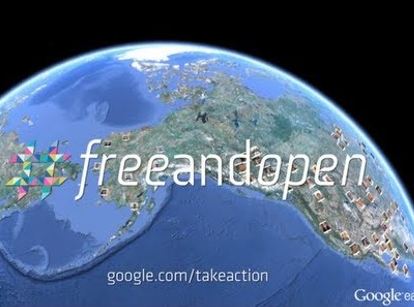 NEWS
NEWS
 NEWS
NEWS
 NEWS
NEWS
![]() The start of the United Nations International Telecommunications Union (ITU) summit in Dubai has caused all sorts of consternation this week, with western governments and some of the internet’s biggest organizations loudly voicing their fears that it could lead to restrictions on its use and the death of free speech.
The start of the United Nations International Telecommunications Union (ITU) summit in Dubai has caused all sorts of consternation this week, with western governments and some of the internet’s biggest organizations loudly voicing their fears that it could lead to restrictions on its use and the death of free speech.
Among those championing a “free and open internet”, good old Google has been the most vocal, mounting an enormous campaign to draw attention to the dangers that the ITU conference poses, whilst various others, including Microsoft, the US House of Representatives, and the European Union have all echoed those concerns.
But just what is going on in Dubai, and do we really have reason to be that concerned? The ITU is a union of representatives from 193 United Nations members, including countries such as the USA, UK, Germany, Canada and Australia – all of whom will be given the chance to have their say at the conference.
Unfortunately – at least, according to the likes of Google – additional member countries include such people as China, Russia, Egypt, Libya, Iran and Zimbabwe, each of whom will be given an equal opportunity to have their say on how the internet should be run.
The ITU is an inherently democratic organization, ran on the principle of ‘one member, one vote’, and herein lays the problem. The big worry is that those countries which are considered to have a more open policy on the internet will be outweighed by those nations that would like to, or already do, censor certain aspects of it.
Some say that the UN, via the ITU, is attempting nothing short of a power grab, to wrest control of the internet and allow governments that are opposed to a “free and open” internet to censor websites and even shut down the web at will.
Among the proposals is one from Russia, which recommends that member states should have equal rights to do the following:
“…manage the Internet, including the allotment, assignment, reclamation of Internet numbering, naming, addressing, and identification resources, and to support for the operation and development of basic Internet infrastructure.”
…which critics says would give members a license to do exactly what they want (such as the right to cut off the internet for undisclosed reasons), which of course, is exactly what the critics don’t want.
Other proposals from nations with less-than-transparent internet policies are rumored to include allowing more governmental monitoring and regulation, and the implementation of ‘tolls’ that would force content providers to pay to reach international audiences. There have even been whispers that the ITU may try to take away governance of the internet from organizations such as ICAAN and others.
But there are two sides to the story and so perhaps it’s only fair that other countries have their say. A large number of those represented by the ITU argue that the USA has an unfair monopoly of control over the way the internet is run. What’s more, internet censorship and monitoring is something that governments across the world routinely practice anyway, and not just by the likes of China and Russia, but in some instances the USA as well.
The motives of some of the “free and open” web’s biggest campaigners are also extremely questionable – most especially Google, which has been accused of being biased towards its own companies in its search engine results, and at one time used to censor content in China so it could operate there.
In light of this, it would seem highly unlikely that any new rules that come out of the ITU conference would actually have any meaningful impact beyond what governments and web companies already impose on us by themselves.
Which makes me wonder, just why on earth did they start this #freeandopen stuff in the first place?
Support our mission to keep content open and free by engaging with theCUBE community. Join theCUBE’s Alumni Trust Network, where technology leaders connect, share intelligence and create opportunities.
Founded by tech visionaries John Furrier and Dave Vellante, SiliconANGLE Media has built a dynamic ecosystem of industry-leading digital media brands that reach 15+ million elite tech professionals. Our new proprietary theCUBE AI Video Cloud is breaking ground in audience interaction, leveraging theCUBEai.com neural network to help technology companies make data-driven decisions and stay at the forefront of industry conversations.